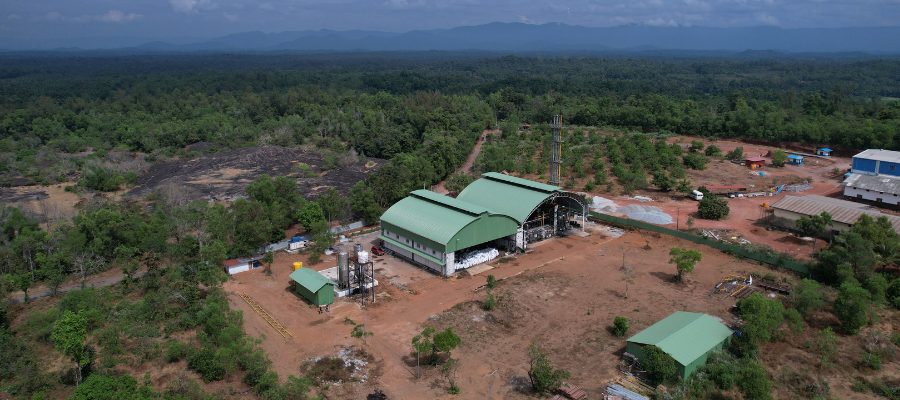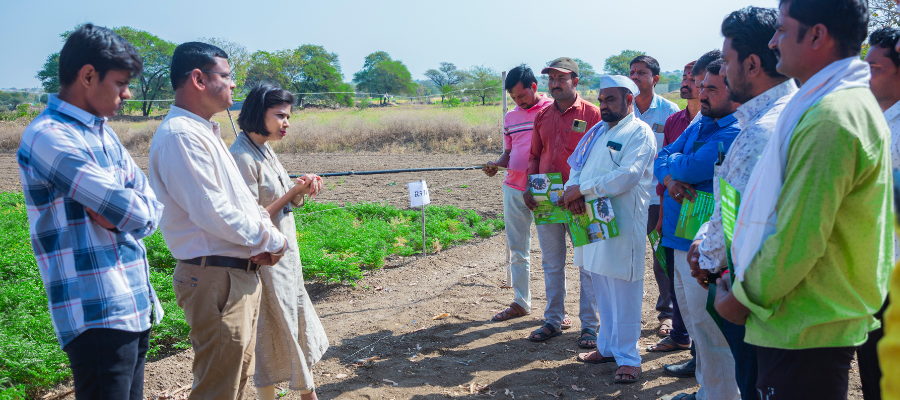🕒 Article read time: 5 minutes
The Big Interview - Jakob Andersen, CEO, Mash Makes

MASH Makes aims to remove at least one gigaton of carbon from the atmosphere by 2040.
Its mission is to produce bio-oil, hydrogen and electricity out of agricultural waste using automated machines. The main byproduct of this process is biochar – a soil amendment that actively absorbs CO2 from the atmosphere. Biochar can then be used to enrich the soil and support the growth of plants.
The first operational MASH thermochemical plant is located in Karnataka, India, with multiple others planned to significantly expand carbon removal efforts globally.
So, we sat down with CEO Jakob Andersen to find out more…
Thanks for meeting with us, Jakob. So, what is Mash Makes’ mission?
It’s actually very straightforward. It’s called ‘gigaton thinking’. Our ambition is to remove at least one gigaton CO2 equivalent from the atmosphere by 2040.
In just 16 years? That sounds extremely ambitious…
We have our own unique proprietary technology platform that enables us to do a lot of very exciting things, so we are very confident of this. The technology comes from the Technical University of Denmark. We are essentially standing on the shoulders of these researchers, who have 40 plus years’ experience within this field of research.
Fundamentally, we can take different types of biomass residues and process them to create an energy output. We turn agricultural residues into premium biochar, ideal for large-scale farming.
So, we can improve the output of, let’s say, arid soils so that they can start producing biomass. By using bottom-of-the-chain biomass, we convert what would be waste into something valuable for agricultural soil — and the planet.
This creates a residue, so more biomass is created and that equates to a scaling of our platform. We want to produce fuel and other energy products in quantities that allow us to make a big dent in the GHG emissions.

Biochar, seen here, is an ash-like material made by heating plant waste, like wood or crop leftovers, in an environment without oxygen. MASH Makes biochar, has been proven to help plants grow better by improving the soil’s ability to hold water and nutrients. Biochar also helps the environment by trapping carbon in the ground, which helps reduce the amount of carbon dioxide, a major cause of climate change.
How will your project affect and influence the logistics sector exactly?
We are currently focused on the shipping sector, but we hope to be able to expand across the sector. We are developing something that looks like a heavy fuel and eventually more diesel-like products and - in the not-so-distant future - hydrogen.
So, this can power a cargo ship?
Currently, the shipping industry does not anticipate the use of pure hydrogen as a standalone fuel. Instead, hydrogen is expected to be used as a component in other fuels. While other pathways like methanol and ammonia are being explored in the shipping industry, they require new infrastructure to be built. The transition to these new fuels will be gradual, and our gasifier technology is designed to support a range of fuels, including those that require new infrastructure.
Our focus today is on creating 'drop-in solutions.' These are fuels that can be seamlessly integrated into existing engines and infrastructure without the need for significant modifications. Converting to electricity would require extensive reworking of current systems, which is why we prioritise liquid fuels that can be used immediately within the existing infrastructure.
If there is a need for electricity, we can produce it. Similarly, we can produce ammonia, methanol, or hydrogen—our gasifier technology allows for this level of diversification. It's a versatile starting point that opens up various pathways depending on what the market requires. Our platform is designed to be relevant and adaptable to multiple energy solutions, ensuring we can meet the demands of different sectors.

MASH Makes' first production facility in Udupi, India is already producing biochar and biofuel.
Why not just focus on electricity?
Very few vessels, especially large ocean-going ships, run on electricity, and the demand for electric solutions in the shipping industry is limited. Focusing solely on electricity would require significant changes to existing infrastructure and storage systems, which is neither practical nor in high demand for the shipping sector.
By producing liquid fuels, we offer these ‘drop-in solutions’ that can be seamlessly integrated into existing engines and machinery. This approach avoids the costly and time-consuming retrofitting that would be necessary for electricity-based systems. Our focus on liquid fuels makes the transition to cleaner energy more practical and immediate, particularly in sectors like shipping, where flexibility and ease of implementation are crucial.
So, because the technology works in existing infrastructure, logistics operators don't have to have all the kinds of safeguards which you have for gaseous fuels or for methanol.
What particular safeguards are you referring to?
Fuels like hydrogen and methanol, which have low flashpoints, are fire hazards that require specialised safety measures, including pressurised storage, robust containment systems, and complex handling procedures to prevent leaks and manage high-pressure environments. These safeguards are essential due to the flammability and volatility of these gases.
However, only a fraction of the world’s fleet is equipped with these safeguards, and therefore equipped to handle these fuels. That’s why our biofuel, which can be used as a drop-in alternative to fossil fuels, is so powerful. It does not require changes to existing infrastructure.
This is crucial, as reengineering current machinery and retrofitting ships is a nightmare for the shipping industry – it requires ship owners to take vessels out of service and then spend a heck of a lot of money on these alterations. The sector has been calling for something like this for a long time.
In addition, even if today the whole shipping sector decided that it was going to commit to retrofitting ships, it wouldn't be able to do this quickly because there's simply not enough shipyards on the globe to achieve that. Having these drop in fuels is key to transitioning to net zero shipping.
In fact, these fuels are far more scalable than many people would currently believe. Our most recent versions of fuel are much closer to diesel than earlier versions. And we are just progressing along that line. We will - very soon – be able to synthesise things like methanol, ethanol and all those fuels that are used in the logistics sector.
That's really the pathway we're starting with – going for the lower hanging or lower grade products and then moving into ever more ambitious commodity targets.

A MASH Makes research scientist explains the benefits of biochar to Indian farmers, highlighting how it improves soil health, boosts crop growth, and helps combat climate change by capturing carbon in the soil.
How well known in the shipping industry has MASH Makes become?
We are talking to a lot of the world's biggest ship owners, and they are following this very, very closely and with a great deal of interest. We've not been that deliberate in publishing anything because we already had so much interest from these parties.
I think there's been a big, positive shift towards alternative fuel solutions like our bio-oil. It is very clear from recent developments that they are really eyeing this space, the biofuel space, the pyrolytic, or the thermochemical biofuel space as something that will have a much bigger role.
Do you see a time when you would be able to supply en masse, other modes of transport?
Absolutely. Ours is a gigaton ambition, right? There's a finite amount of stuff like uranium and gold on the earth but the thing we have in our own production is an output which is literally able to turn deserts into productive biomass systems.
We are going to do this in India in the near future - find arid areas that are today unproductive and treat them with our biochar channel.
We will make sure that there are meaningful allocations to local farming communities so they can gain from these areas being developed. And then we ask, ever so kindly at the end of the day, could we take your residues, right?
You don't care if they're going to produce food for local systems or wood for materials, we just want to take the residues that would come from whatever they're doing.
That is a key component to our scaling strategy. These are like two dots that have just been sitting there and for some reason, no one's ever drawn a line between them. It's so obvious and this is something we are trying right now in India.
Can you give me an idea as to how big the company is?
MASH Makes is comprised of a team of 65 people across Denmark and India. Our existing site in India is reaching optimum productivity later this year and we have already funded the next one. Our existing plant is producing biochar as we speak and we're very close to closing on the third and fourth sites.
We can maybe build 50 to 100 more factories of this particular type. But if we are to have the necessary impact, we will need literally tens of thousands of them.
If something goes wrong, if there's a problem, like a drought, bureaucracy or corruption, whatever, you can literally pick the stuff up and redeploy it elsewhere.
And so why India? Is that because it's very rich in the resources you need?
Exactly. This isn’t the classic Danish commercial rollout fantasy, which is ‘let's make it work in Denmark and then we go to the rest of the world’. Denmark doesn't look anywhere like the rest of the world. India is of a lot more like the rest of the world than Denmark.
By this I mean, for example, the cost of labour. If I was to do something like this in Denmark, I would have a very high degree of automation in place compared to the likes of India or Kenya. That simply means that I'm missing out on the opportunity for local job creation, the chance to create a decent job for someone.
But the main reason from a strategic perspective is that there are just far greater biomass residue resources in India, in sub-Saharan Africa, and in South America. Europe really isn't the panacea for bioenergy that many would have us think. The big resources are elsewhere on the globe, and we want to develop a solution that works on a global scale.
Maybe the future for British logistics could be to source fuels that are produced sustainably and responsibly with great positive social and environmental impact in a place like India.
Biochar creation must be on government radars as well as businesses?
There is a sort of humanitarian tint to it, yes, and we're seeing a lot of interest from what you call development, finance institutions, who are typically government bodies or semi government bodies.
Even NGO funds - these big development funds have heard of it - like the Bill and Melinda Gates foundations of the world. So yes, absolutely. In our work, there's a synergy between creating better lives for impoverished populations and at the same time strengthening sustainable energy systems. That's a win.
Published On: 18/11/2024 12:04:23
